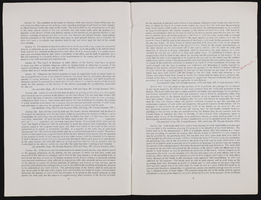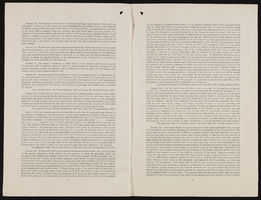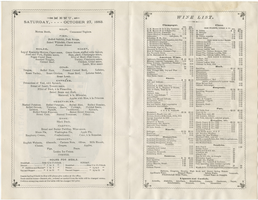Search the Special Collections and Archives Portal
Search Results
Kaweeda Adams oral history interview
Identifier
Abstract
Oral history interview with Kaweeda Adams conducted by Kim Kershaw on March 05, 2004 for the Public School Principalship Oral History Project. In this interview, Adams reflects upon her career as a teacher in Louisiana from the 1980s to the 1990s, and as a teacher and administrator with Nevada’s Clark County School District (CCSD) from the 1990s to the early 2000s. She discusses her upbringing, and how her upbringing influenced her pursuit of education. She describes the process by which she became a teacher and eventually administrator, and compares her experiences working in Louisiana and Nevada. She discusses how these experiences shaped her philosophy of education, as well as changes that she has observed in the students over time. She describes her regular job duties, as well as challenges that she faced as a school administrator such as teacher dismissal and evaluations.
Archival Collection
Q. B. Bush Papers
Identifier
Abstract
The Q. B. Bush Papers are comprised of Q. B. Bush's personal papers dating from 1957 to 2018 and document Bush's work in Westside Las Vegas, Nevada casinos including the Moulin Rouge, Town Tavern, and the El Morocco. The collection also documents Bush's involvement with the Dealers Security Association and the association's effort to provide better working conditions for African American casino employees. Included are both original photographs and copies of photographs that document the African American casinos where Bush worked, as well as the Bush family at various events.
Archival Collection
John West oral history interview
Identifier
Abstract
Oral history interview with John West conducted by Claytee D. White on August 10, 2000 for the Boyer Early Las Vegas Oral History Project. In this interview, West discusses his family background and arriving to Las Vegas, Nevada in 1954. West describes his educational experiences in Las Vegas and his career as a clinical psychologist. He recalls his father’s career in medicine and becoming the first African American licensed medical doctor in Las Vegas. West then talks about attending entertainment events before race integration was introduced, and the voting patterns in West Las Vegas. Lastly, West discusses his father’s decision to remain living in West Las Vegas and operating his medical office there after integration.
Archival Collection
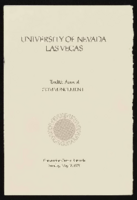
University of Nevada, Las Vegas (UNLV) 12th commencement program
Date
Archival Collection
Description
Commencement program from University of Nevada, Las Vegas Commencement Programs and Graduation Lists (UA-00115).
Text
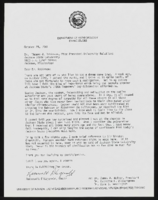
Roosevelt Fitzgerald: correspondence regarding Jackson State University
Date
Archival Collection
Description
From the Roosevelt Fitzgerald Professional Papers (MS-01082) -- Personal and professional papers file.
Text



